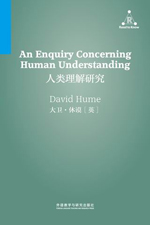为人类理解研究
The main content of Research in Human Understanding is empirical epistemology, including conceptual theory, causality and skepticism. It also includes ideas such as "miracles, providence, and the afterlife." Hume called his philosophy "the science of man", referring to the study of human nature as opposed to natural science. Therefore, Hume also called this science "the science of human nature". The so-called human nature here has a broad meaning, which includes the aspects related to human cognition, emotion, taste, morality and ritual behavior. The concept of "science of human nature" is in line with the rise of modern enlightenment, the advocation and attention of human nature, and is also a reflection of the trend of theoretical philosophy breaking up with natural science.
The book argues that human understanding is very weak and the scope of understanding is also very narrow. In the past, however, philosophy failed to recognize this problem, and often discussed things beyond the capacity of human understanding. As a result, there was no consensus, which gave rise to many unnecessary disputes, and from which different factions were formed. If philosophers discuss problems within people's ability and scope of understanding, they will be relieved of many troubles and obtain happiness.




 京公网安备 11010802032529号
京公网安备 11010802032529号